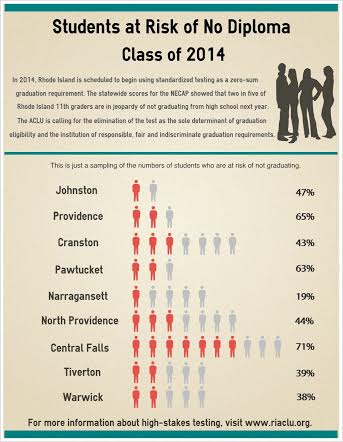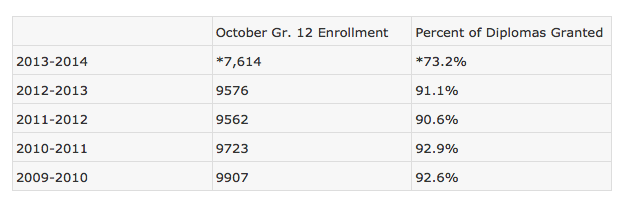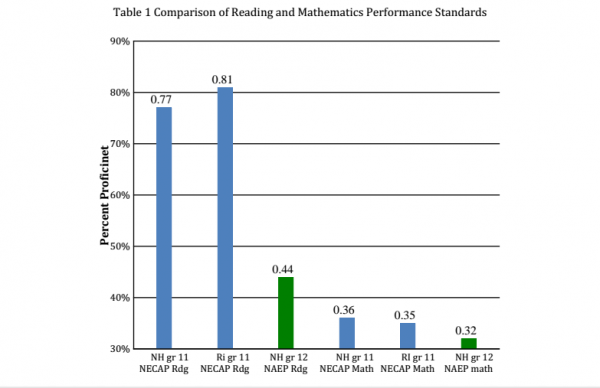 The ACLU of Rhode Island and a coalition of 11 other organizations representing youth, parents, the disability community, and civil rights activists Tuesday filed a formal petition with the state Council on Elementary and Secondary Education to initiate a public rule-making process to bar school districts from using high-stakes testing as a graduation requirement or grading tool before 2020.
The ACLU of Rhode Island and a coalition of 11 other organizations representing youth, parents, the disability community, and civil rights activists Tuesday filed a formal petition with the state Council on Elementary and Secondary Education to initiate a public rule-making process to bar school districts from using high-stakes testing as a graduation requirement or grading tool before 2020.
After the Rhode Island General Assembly approved a moratorium last year on the use of high-stakes testing until at least 2017, the Council, with support from the Commissioner of Education, proposed to continue the moratorium until 2020 in order to ensure students, parents, and teachers had adequate time to prepare for the new PARCC test. However, in adopting final regulations, the Council reversed itself and instead gave school districts the authority, if they chose, to institute high-stakes testing with the class of 2017. Shortly thereafter, the Commissioner unilaterally advised districts that they could also begin using PARCC scores as a component of students’ grades as early as this coming year. These developments prompted our petition.
Under the Administrative Procedures Act, the Council has 30 days to respond, either by denying the petition or by initiating a rule-making process where the public can testify and the Council can consider whether to accept, modify, or reject the proposal. Accepting the petition would provide the public with its first real opportunity to discuss the Council’s expedited schedule for use of the PARCC.
In the letter accompanying the petition, we pointed out that across the country school districts are encountering problems with the implementation of statewide standardized testing; more parents, teachers, and students are opposing such testing; and the number of states using PARCC had declined from 25 to 13 in just a few years. Waiting until 2020 to use PARCC scores against students was necessary in order to give RIDE and school districts “adequate time to put the instructional and other supports in place to give every student a fair chance to pass the PARCC.”
In addition to the ACLU of RI, the Coalition to Defend Public Education, George Wiley Center, NAACP Providence Branch, National Association of Social Workers/RI Chapter, Parent Support Network of Rhode Island, Parents Across Rhode Island, Providence Student Union, Rhode Island Disability Law Center, Rhode Island Teachers of English Language Learners, Tides Family Services, and Young Voices signed on to the petition.
We emphasized to the Council that it did not need to take a definitive stand on the merits of the petition in order to initiate rule-change proceedings. “Although we hope to ultimately convince you of the merits of this rule change, we trust you agree it is at least worthy of a full public discussion, and of one sooner rather than later,” our letter stated.
Jean Ann Guliano, from Parents Across Rhode Island, said: “Once again, the state has implemented a top down mandate without providing parents a meaningful mechanism to hold districts accountable. Districts are simply not providing students – particularly those living in poverty, or with special needs or limited English proficiency — the supports that RIDE requires districts to provide and that students need to do well on the PARCC. Students should not be the ones held accountable for poor testing preparation. This policy needs to change.”
For more on the ACLU’s efforts to halt high-stakes testing in Rhode Island, visit our issues page here.
]]> Mark your calendars! An event May 16 will address the shameful state of public education that is due not to bad teachers and low expectations, but to a decades long, relentless regime of standardized curricula and incessant testing in order to measure, rank, and sort children for a new world order amenable to manipulation by corporate interests.
Mark your calendars! An event May 16 will address the shameful state of public education that is due not to bad teachers and low expectations, but to a decades long, relentless regime of standardized curricula and incessant testing in order to measure, rank, and sort children for a new world order amenable to manipulation by corporate interests.
The struggle to wrestle power out of the hands of the billionaire technocrats who have a dystopian vision for public schools is ongoing and gaining steam. Those who are determined to transform and democratize public education for the benefit of our children, our schools, our communities, and our democracy have a herculean task ahead of us.
The maxim attributed to Gandhi comes to mind: First they ignore you, then they laugh at you, then they fight you, and then you win! True public education advocates are now engaged in fighting against the faux-reformers, those who use their money, power, and influence to make the lives of children and teachers miserable in the name of lifting all boats and preparing all children for their slot in the glorious technocratic future – a future that exacerbates the obscene wealth inequality in the United States of America.
 Rhode Island as well as states across the country have been witnessing the awakening of the group of people who have the most personal stake in the outcome of public education—the parents. As parents become informed about the true nature of the education reforms of the Common Core State (sic) [Stealth] Standards and the incessant testing (PARCC here in RI, SBAC in other states), as they see the poor quality of the class work and home assignments that their children come home with, compared to the enriching materials and activities their older children had in the past, they know something is terribly amiss. Opting their children out of the PARCC is the first and best strategy for now to bring attention to the flaws with the Common Core/PARCC agenda, as well as to deny the state and numerous ed tech companies the data that would flow from this test.
Rhode Island as well as states across the country have been witnessing the awakening of the group of people who have the most personal stake in the outcome of public education—the parents. As parents become informed about the true nature of the education reforms of the Common Core State (sic) [Stealth] Standards and the incessant testing (PARCC here in RI, SBAC in other states), as they see the poor quality of the class work and home assignments that their children come home with, compared to the enriching materials and activities their older children had in the past, they know something is terribly amiss. Opting their children out of the PARCC is the first and best strategy for now to bring attention to the flaws with the Common Core/PARCC agenda, as well as to deny the state and numerous ed tech companies the data that would flow from this test.
Now that Opting Out/Refusing is catching on, thanks to the tremendous work of many education activists doing the research and informing the public, the federal DoE and RIDE are scratching their heads and figuring out vindictive ways to squash this rebellion that after all, upsets their apple cart and stands to lose money for global corporations like Pear$on. Imagine—threatening to lower the rating of a school because more than 5% of the parents determine that the PARCC is counter-productive for their children and Opt them out. These parents should be applauded for engaging in their child’s education and using the means at their disposal to make a strong statement about a policy that is wrong for children, wrong for teachers, and wrong for communities.
The Coalition to Defend Public Education (Providence) and the SouthEast MA/RI Coalition to Save Our Schools will be hosting an education activist summit: Transforming and Democratizing Public Education on May 16 at the Southside Cultural Center, 393 Broad Street in Providence from 10 a.m. to 2 p.m. (lunch included!) There will be no expert presentations, though the activists in attendance will come with tremendous expertise and drive. This event will begin with a sharing of struggles and successes among parent, teacher, and community activists discussing the following topics:
- Testing refusal – empowering curriculum
- Parent Organizing/ Communities of Color
- Charter schools
- Teachers unions
- Student organizing
- Higher education
The afternoon session will focus on a vision for the future—brainstorming on strategies to transform and democratize our public education system so that it truly provides the well-rounded, well-researched curriculum and inspiring environment that our children so desperately need and deserve, and our democracy depends upon. Come join us and be a part of those bravely standing up to the corporate education juggernaut that reduces and dehumanizes unique human beings to a single digit.
]]> A high stakes test graduation requirement is outlawed until 2017, but it’s still pitting Board of Education Chairwoman Eva Mancuso against the activists who fought to ban it.
A high stakes test graduation requirement is outlawed until 2017, but it’s still pitting Board of Education Chairwoman Eva Mancuso against the activists who fought to ban it.
The Providence Journal reports that using the NECAP test as a graduation requirement would have only deprived one student of a diploma, and in that article Mancuso is quoted as saying: “Maybe everybody should trust the professionals rather than running behind our backs and going to the legislature. The system worked just fine.”
In “response” six groups who argued to suspend the NECAP graduation requirement, sent a letter to legislative leaders:
An article in today’s Providence Journal quotes RI Board of Education Chair Eva S Marie Mancuso as citing RIDE! data that only one student benefitted from the “high stakes testing” moratorium bill that passed at the end of the session. In doing so, she suggests that passage of the law was unnecessary (or worse), and that its impact was negligible. Since she expressed interest in informing the General Assembly about the law’s impact from the Board’s perspective, our organizations thought! it worth making you aware of! it from our less defensive posture.
The groups are the RI ACLU, the Providence NAACP, the Providence Student Union, young Voices, RI Teachers of English Language Learners and Parents Across Rhode Island. You can read the letter here. It says the data is inaccurate (the ProJo article says only one student would have been denied a diploma but the ACLU says this document shows that three students in Bristol alone would not have graduated) and that the number of students potentially denied a diploma was but one reason for the moratorium.
“But perhaps its most important impact is in ensuring that, at least for the next three years, teachers won’t have to waste hours and hours of classroom time teaching to an irrelevant test, and students won’t be dragged out of real classwork in order to spend pointless hours cramming for a meaningless standardized test.”
]]> With high school graduation imminently approaching, legislators, mayoral candidates, students, teachers, parents and community organizations have been discussing with frequency the Board of Education’s high stakes testing requirement for seniors. Remarkably, about the only entity that hasn’t publicly discussed the merits of the requirement is the Board itself.
With high school graduation imminently approaching, legislators, mayoral candidates, students, teachers, parents and community organizations have been discussing with frequency the Board of Education’s high stakes testing requirement for seniors. Remarkably, about the only entity that hasn’t publicly discussed the merits of the requirement is the Board itself.
Thanks to a court decision on Friday, that will soon change. But the Board’s refusal for so long to publicly defend their controversial policy – one that has the futures of literally hundreds of students hanging in the balance – demonstrates why it is critical for the General Assembly to step in and halt the NECAP testing requirement.
On three separate occasions in the past nine months, courts have found that the Board violated open government laws in avoiding publicly discussing the NECAP issue. In this most recent ruling, Superior Court Judge Luis Matos ordered the Board to finally come out of hiding.
Specifically, in response to a lawsuit we filed some months ago, the judge has required the Board to publicly discuss and vote on a petition submitted last June that asks the Board to hold a hearing on eliminating high stakes testing.
 Last September, in a private meeting – that the judge held was a clear violation of the open meetings law – the Board rejected the petition by a 6-5 vote. Minutes of the secret meeting show that those who voted it down objected to reconsidering the mandate without having fall’s NECAP test results. Well, that excuse no longer exists. We know the results, and we know the harm that the NECAP requirement is wreaking on too many Rhode Island’s seniors, especially students with disabilities, English Language Learners, and those in the inner cities.
Last September, in a private meeting – that the judge held was a clear violation of the open meetings law – the Board rejected the petition by a 6-5 vote. Minutes of the secret meeting show that those who voted it down objected to reconsidering the mandate without having fall’s NECAP test results. Well, that excuse no longer exists. We know the results, and we know the harm that the NECAP requirement is wreaking on too many Rhode Island’s seniors, especially students with disabilities, English Language Learners, and those in the inner cities.
The court’s ruling is important for accountability: it is long past due for the Board to have a full and fair airing – in public – about why they think students’ futures should be ruined on the basis of an arbitrary standardized test. But the Board has dawdled long enough. It is difficult to put much faith in an agency that has violated the law three times to avoid the issue.
Whatever the Board ends up doing, let’s hope that legislators will take Friday’s ruling to heart, say “enough is enough,” and pass a bill that, at a minimum, puts a moratorium on high stakes testing. The stakes for hundreds of seniors are too high to wait any longer.
]]> Susan Lusi, the superintendent of the Providence school department, has come out against the NECAP graduation requirement, and Eva Marie Mancuso, the chair of the Board of Education, has accused her of “grandstanding” by presenting her concerns to the legislature rather than to her board.
Susan Lusi, the superintendent of the Providence school department, has come out against the NECAP graduation requirement, and Eva Marie Mancuso, the chair of the Board of Education, has accused her of “grandstanding” by presenting her concerns to the legislature rather than to her board.
Ha ha. This is funny because over the past year, Mancuso has maneuvered the Board and its agenda to shut down any possibility of real discussion of state testing policy. If Susan Lusi has chosen to use a different forum to make her concerns known, Mancuso might be the only person in Rhode Island who wonders why.
As I’ve written in the past, I have completely failed to find a forum in this state even for simply presenting a technical critique of the use of NECAP tests to anyone in authority. What’s remarkable about this is that a technical critique is more than just a statement of opinion. It’s an opinion about how the future will unfold. What I observe is a natural consequence of arithmetic, statistics, and the choices of the test designers. The results are impervious to the attention they get. Whether anyone listens to the critique or not is irrelevant to whether or not its effects will be felt. To date, I have not heard or seen a single response to my critique that did not rely on purposefully misconstruing it, and it has been endorsed by people who know a lot more about testing than I do.
If my critique is correct, then lots of kids will flunk the NECAP test, pretty much no matter what. I don’t have to be heard at a Board of Education meeting for this to come true. If my critique is correct, then RIDE is wasting a lot of money forcing school districts to undermine the test they have spent so much money designing and promoting. I don’t have to be on the radio for this to come true. If my critique is correct, performance on the NECAP test will not be well correlated with performance in college or a job. I don’t have to be called by a reporter for a response to RIDE’s many misstatements for this to come true.
These are serious consequences, with dollar signs attached to them. Not to mention thousands of damaged lives. Unfortunately, they are no longer just future possibilities. At this point, six hundred Providence students, along with over a thousand of their peers around the state, are at risk of not graduating from high school. To some extent their school systems have failed those kids, and to a large extent RIDE has failed them.
Policy makers have a responsibility to consider the consequences of their actions. Simply ignoring the possibility of bad consequences — precisely what has happened — is utterly irresponsible. Eva Marie Mancuso and Education Commissioner Deborah Gist, by doing everything they can to shut down debate over their policy, have demonstrated that they simply do not care about the consequences of their decisions. They claim to care about the students for which they are responsible, but belie those empty claims with their actions.
The rumors I hear are that Mancuso yearns to be appointed to the bench. Just the sort of judge we want: the kind who refuses to hear evidence. Gist wears her career ambitions on her sleeve, and they obviously extend far beyond our little state. Presumably advances in test scores will help her career after her contract here expires, and get her a lucrative book deal about how she turned around a little state. What are the lives and futures of a couple thousand kids when weighed against that kind of success and fame?
It is indeed true that having high school graduates who cannot do math is bad for our state. Is it not also true that having education policy makers who do not care about math is equally bad for our state?
]]> National education experts are now joining students, parents, education and advocacy groups and the RI ACLU in urging the Department of Education to end its mandate requiring students to pass the NECAP test in order to graduate.
National education experts are now joining students, parents, education and advocacy groups and the RI ACLU in urging the Department of Education to end its mandate requiring students to pass the NECAP test in order to graduate.
Three national education experts are submitting written testimony to the House Health, Education and Welfare Committee today in support of legislation that would delay or halt the state’s “high stakes testing” requirement for high school seniors.
The experts say, among other things, that high stakes testing requirements increase dropout rates, narrow curriculum, and disproportionately impact minority students and students with disabilities. In fact, according to the latest RIDE statistics, almost 1,600 seniors remain at risk of not getting a diploma because of the testing requirement.
Here are brief excerpts from their written testimony:
Linda Darling-Hammond, professor of Education at Stanford University, director of the Stanford Center for Opportunity Policy in Education, and education adviser to Barack Obama’s 2008 Presidential Campaign:
“The preponderance of research indicates that test-based requirements for graduation do not generally improve achievement, but do increase dropout rates… Studies have raised concerns about reduced graduation rates, especially for African American and Latino students, English language learners, and students with disabilities; reduced incentives for struggling students to stay in school rather than drop out or pursue a GED; increased incentives for schools to encourage low-achieving students to leave school, especially when test scores are part of the state school accountability system, so as to improve the appearance of average school scores; narrowing of the curriculum and neglect of higher order performance skills where limited measures are used; and invalid judgments about student learning from reliance on a single set of test measures, a practice discouraged by professional testing experts.” (Full testimony)
Ron Wolk, founder of Education Week, the newspaper of record in American education:
“Despite hundreds of millions of dollars and countless hours spent on standards and testing over the past 25 years, student achievement has not significantly improved, and the gap that separates needy and minority students from more affluent white students persists. … [A recent RIDE report] reveals that over the past five years, reading and math scores in the 4th, 6th, and 8th grades have increased by about 4 percent—about 0.8 percent a year. Eleventh grade scores in both reading and math increased by an impressive 8 percent over the past five years. Since more than 25 percent of all Rhode Island students score below proficient in reading, however, and about 40 percent score below proficient in math, it could take roughly 25 more years to get all students to proficiency in reading at the current rate of progress, and as many as 40 years to get all students to proficiency in math. Most importantly, it is a serious mistake to equate test scores with learning. Studies have shown that intense test preparation can raise scores, but the ‘learning’ is often transitory and temporary.” (Full testimony)
Lisa Guisbond, policy analyst for the National Center for Fair and Open Testing (FairTest):
“The ‘model’ exit exam state, Massachusetts, still has persistent, unacceptably large gaps in educational opportunity and achievement… In Massachusetts, disparities in dropout rates persist more than 10 years after the state adopted MCAS high school graduation tests. Latino and African-American students drop out at rates three to four times that of white students, and 11th and 12th graders who have not passed MCAS are more than 13 times more likely to drop out of school than those who have passed . . . Students with disabilities have been hit particularly hard and make up a steadily growing portion of Massachusetts students who don’t graduate because of the MCAS graduation test. Students receiving special education were five times more likely to fail MCAS in 2002-03; by 2011-12, they were 15 times more likely to fail.” (Full testimony)
The RI ACLU is also testifying in support of these bills and will continue to work towards the elimination of standardized test results as a graduation requirement.
]]> As a General Assembly committee considers today a bill that would suspend high stakes test graduation requirements and reevaluate Rhode Island’s commitment to Common Core, there is a debate raging both here and across the nation about whether such accountability measures account for more harm than good.
As a General Assembly committee considers today a bill that would suspend high stakes test graduation requirements and reevaluate Rhode Island’s commitment to Common Core, there is a debate raging both here and across the nation about whether such accountability measures account for more harm than good.
“The Common Core State Standards were hailed as the next game changer in education,” wrote NEA President Larry Purtill on this blog recently. “Unfortunately, the way it is going, they may ruin the game, not just change it.”
Time was perspectives like Purtill’s were easily dismissed as a special interest. But other special interests in Rhode Island – parents, students, taxpayers and civil libertarians – have also organized to fight these corporate-backed “reforms” to public education.
The ACLU of RI and underfunded urban school districts in Rhode Island have long fought these measures first implemented by George Bush and heavily backed by both corporate and Wall Street interests. But then something new happened here.
The Providence Student Union made national news when they made adults take the test teenagers face as a graduation requirement. And following their inspiration, a parent group from East Greenwich is fighting against these kinds of education “reforms.” That group is led by a former Moderate Party candidate for lt. governor who was an enemy of organized labor as a member of the East Greenwich School Committee.
Opposition to high stakes testing in Rhode Island has brought together the formerly disparate interests of tax-obsessed suburban parents, underfunded inner city students, social justice activists and educators.
“The current misuse of and over reliance on standardized testing in education is nothing short of unethical and immoral,” according to Parents Across Rhode Island’s website. “Standardized tests like the NECAP are simply not able to accurately measure the knowledge and skills of all students, yet they are being used for major decisions such as graduation, promotion and teacher evaluation.”
And it’s not just happening here in Rhode Island. All across the country (please read: “Education Uprising: the Myth Behind Public School Failure“) education activists are preparing to step up the fight from peaceful street theater and strongly worded blog posts to direct action and what might be considered civil disobedience.
A new national coalition known as Testing Resistance and Reform Spring made national news last week.
“The emergence of the alliance represents a maturing of the grassroots testing resistance that has been building for several years locally in states , including Texas, Florida, New York and Illinois,” wrote Washington Post education blogger Valarie Strauss. “Though many supporters of Barack Obama expected him to end the standardized testing obsession of George W. Bush’s No Child Left Behind when Obama was first elected president, many now say that the Obama administration has gone beyond the excesses of NCLB to inappropriately make high-stakes standardized tests the key measure of achievement by students, teachers, principals and schools.”
According to the group’s website, it supports “a range of public education and mobilizing tactics, including community meetings, boycotts, opt-out campaigns, rallies, petition drives and legislation. TRRS will help activists link up, communicate and learn from one another. This will build a stronger national movement to overhaul assessment policies.”
The new umbrella group has affiliates all across the nation, including Rhode Island. The RI affiliate offers a detailed blueprint for opting out of the NECAP test and graduation requirement for parents and students.
“The RIDE policy does not allow exemptions based on a refusal to test,” according to a pdf on the site. “Therefore no exemption’ will be granted on these terms. Parents/student will have to state that they are REFUSING the test rather than requesting an exemption.”
It says so far, no Rhode Islanders have opted out of the NECAP test. But there was this comment on the site from a student: “Hi, I am an 11th grader in RI and I need to take the NECAP’s to graduate even though I and my parents are HIGHLY against high stakes testing. With the opt out, would I be able to not take the test and still graduate?”
]]>A statement like this puts everyone on notice. It tells our students they had better try harder; it tells our teachers they need to stay on track and get better results; and it tells our schools they need to raise their test scores. The subtext of the statement is that there is a big crises and just about everyone in the school system is to blame.
And just behind this subtext is the further ominous and obvious subtext that everyone in the schools needs to be held accountable until we get out of this mess.
But what kind of a mess are we in? What if our low math scores are the result of how we measure math instead of how we teach math? If that is the case, there is much less of a crises and the argument for holding everyone to high stakes accountablity–students don’t graduate, teachers get fired, schools get taken over–
has much less traction.
Since a lot rides on the answer to this question—is it the way we teach math or is it the way we measure math?—it’s worthwhile trying to answer it.
One way to go about this is to compare the performance standards set by different tests. A performance standard is sometimes expressed as a grade level, as in, “the proficiency level of the grade 11 NECAP is set at a ninth grade level”. In this case, a student demonstrating proficiency would show us that he or she has mastered the expectations of a student completing ninth grade. That is, the student would get most of the questions with ninth grade content and ninth grade difficulty right, but would get many fewer questions set at higher levels of difficulty or questions covering topics not usually taught until tenth grade or later.
The way this would show up on a test would be in the average score of the students taking the test—a test set at ninth grade proficieny would have a higher average score than a test set at the eleventh grade proficiency level if they are taken by the same group of students. That makes sense–the eleventh grade standard for proficiency is harder than the ninth grade level because students have covered more content and developed stronger skills.
Back to the basic question—is it the way we teach math or the way we measure math? If we look at the way the NECAP measures reading, we can see that in the two states that take the test in grade 11, New Hampshire and Rhode Island, about 80% of students achieve proficiency. If we say 80% achieving proficiency indicates the test is at an eleventh grade level, then we have to wonder about the NAEP results students in these states achieve because less than half achieve proficiency.
We then have to ask ourselves, what performance standard is NECAP using? Whatever it is, it is much lower than the performance standard NAEP uses because a much higher percentage of students pass. In fact. over 80% more students pass NECAP than pass NAEP, so you can think of the NECAP performace standard as almost twice as easy as the NAEP performance standard. The tests are using different performance standards.
If you look at math, the results are startlingly different—here the percentages passing NECAP and NAEP as very comparable, meaning both tests use the same performance standard. And if you look at the NAEP reading and math performance standards, they are pretty comparable, with reading a little higher than math.
It looks like NAEP, the national measuring stick, uses about the same performance standard for reading and math while the NECAP does not.
Now, you can argue that NECAP has set the math performance standard right and has used a reading standard that is too easy. Then, of course, we would have a reading and a math problem instead of just a math problem.
But either admitting the math standard is too hard or the reading standard is too easy would mean admitting that something is wrong with the way NECAP standards have been set, something the Department of Education and the Commissioner have steadfastly denied.
I think that, at heart, they have denied such an obvious fact because it is too costly to their policy agenda to admit that anything could be wrong with the tests.
To do so would be to cast doubt on the expertise of the test designers who are the ultimate source of authority in the accountability debate. If test designers are wrong and tests are fallible, then how we measure students, teachers and schools is up for grabs. RIDE loses its top down leverage.
In the same article, Gist said, “Now is not the time to rethink our strategy.”
“Holding students accountable is really important,” she said. “We cannot reduce expectations.” The Chairman of the Board of Education, Eva Mancuso echoed the thought, “We are on the right course.” This sounds like a comment from the bridge of the Titanic.
]]>
See where the percentage scoring at least “2” on the MCAS jumps about 20% between years three and four? That’s the graduation requirement kicked in for juniors. The same effect in theory should have kicked in in year six (last year) for the RI NECAP, but there was no corresponding jump.
The 2013 NECAP results, which have been partially released on RIDE’s website, continue the past trend. The number of 11th graders statewide scoring “1” or “substantially below proficient” decreased just 4% to 36%. This is simply not enough progress to show the policy is working. If you dig down to individual districts and charter schools — demographic and other in-district breakdowns are not available — it is even more disappointing (past years’ data from here):
- The state’s flagship turnaround at Central Falls High School has the same number of students scoring “1” in 2013, 73%, as in 2008. After all the turmoil, expense, and the reformers’ best effort, no change.
- Providence Public Schools has bumped the “1’s” down from 67% in 2008 to 63% in 2013.
- Barrington High School has only improved 4% since 2008: 12% to 8% scoring a “1” (compared to 1% in reading both years).
- Blackstone Academy, a small (about 40 in the junior class) charter with 85% economically disadvantaged students, has levelled off after some impressive progress with about a third of juniors not meeting the graduation standard.
- Paul Cuffee Charter School, a well-regarded new high school in Providence, still has 52% of juniors not scoring above a “1.”
- A few districts had noticeably fewer students at “substantially below proficient” compared to 2012: North Providence from 44% to 26%; Pawtucket, 63% to 52%; Westerly, 29% to 17%.
- But a other districts saw increases in students not meeting the requirement since last year: Exeter-West Greenwich, +9%; Newport, +4%; South Kingston, +3%.
I should hasten to note that my point here is not to do the typical blame and shame. What seven years of 11th grade NECAP math scores tell me is that nobody has figured out how to increase them, especially among disadvantaged students, to an degree comparable to the MCAS and by enough to make the test an appropriate graduation requirement.
This is not supposed to happen. Two of the fundamental premises of contemporary school reform are that students will rise to the level of expectations, and that incentives drive results. We’ve got the expectations, the incentives could not be clearer or higher stakes to students and all the adult stakeholders and… the results are just not there.
To replicate the MCAS success story, North Providence’s 18 point improvement would have to be the average gain statewide, not an outlier. When your highest flying low-income charter still has a third of its juniors not on track to graduate because of a single test, that’s not normal. If RIDE knows how to increase 11th grade math NECAP scores, why haven’t they told Central Falls? We’ve been paying outside consultants, too, like The Dana Center, who know as much about aligning math curriculum to standards as anyone. Apparently they don’t know the answer either.
Exactly why we — and New Hampshire and Vermont — don’t seem to be able to raise 11th grade NECAP math scores is beside the point. My theory is that 11th grade NECAP math scores reflect “fluid intelligence” more than the MCAS and other standardized tests, and teaching “fluid” skills like analyzing abstract problems and thinking logically in school is difficult and poorly understood.
Or perhaps the difference is simply that the MCAS was a problem designed with its own solution in mind. The test was developed in parallel with a curriculum framework. For schools to raise their MCAS scores, they needed to do a better job of delivering the state curriculum, which was not necessarily easy, but it was straightforward and achievable. There is no equivalent map for increasing NECAP scores.
At this point, the burden of proof should pass to the proponents of the NECAP graduation requirement to lay out an evidence-based strategy for increasing the “pass” rate for NECAP math statewide by 20% that amounts to something other than “stay the course.” We can’t have a third or more of seniors not knowing if they’re going to graduate in February or scrambling for waivers. For this to work, we need Barrington at 99% pass, Westerly and Blackstone Academy at 95%, and Central Falls and Providence need to nearly double the number of students getting over the bar. Maybe it is possible. Tell me how. I don’t see it.
And of course, it is a moot point since RI is moving off the NECAP as soon as possible anyhow. So… seriously, why are we doing this to ourselves?
]]>Even after RIDE’s release of the latest NECAP results, it’s hard to accurately predict the impact of the standardized test requirement for graduation. Historically, we know that over the past four years the percentage has averaged out to slightly less than 92%, with approximately 1,000 seniors dropping out, opting for the GED, or transferring out of state.
But last year 4,159 students failed the NECAP and needed to retake the test to try to get a passing score. Of those students, RIDE reported 1,370 succeeded. Of the remaining 2,789, RIDE reports 154 dropped out. Regardless of these drop-outs, the fall enrollment count for this fall was 10,403, which seems in line with previous fall enrollments. In other words, as RIDE stated, the impact of the testing requirement on grade 11 drop-outs was not much.
If 4,195 students failed last year and 1,370 passed this year, our best guess is that 2,789 students in this class of seniors will not graduate with diplomas. For the sake of simplicity, this number assumes that all students dropping out, moving away from the state, or getting a GED are also students who failed the NECAP on their first try.
This is what that number does to the number and percentage of seniors graduating with diplomas: it decimates them.
 [* Estimates based on number of students from the class of 2014 failing NECAP for the second time (2,789)]
[* Estimates based on number of students from the class of 2014 failing NECAP for the second time (2,789)]
Of course, 2,789 is the number before students begin to take the numerous alternative tests available, including the “min-NECAP”, and activate whatever waiver process their districts have in place to compensate for a failing NECAP score.
Hopefully, the 2,789 number will go down. If districts adopt liberal waiver policies, if could go down considerably.
But from this point on, the picture for these 2,789 students looks like a form of mayhem—they will be searching out opportunities to take a variety of tests, only one of which (SAT math) has its cut-score connected to the NECAP by more than air-thin logic. Or they will be trying to get admitted into a “non-open enrollment college”. Or they will be navigating whatever waiver requirements their district has put in place, which requires them to assemble whatever evidence of academic achievement their district has decided to accept.
It’s not a pretty picture for students from here on, and that’s the larger point.
Students who come from organized, well-resourced districts and have organized, well-resourced parents will do best of all and from there on it’s downhill until the devil take the hindmost.
This is as vivid a picture as possible of why the testing policy fails the mission of our education ideal—to educate all children well and to provide an education that will be the entrée to a productive life and career. Our education system has slowly been moving in this direction by including more and more academically vulnerable students into our enrollments–students with learning disabilities, students who do not speak or write English well, students from families with little of no literacy background.
These students pose a challenge to our traditionally structured education system.
They require especially skilled teachers, special lesson plans, more time, smaller classes and, in general, more resources. But, with more adequate and equitable funding, better teacher professional development, and innovative programming, we have slowly been learning how to help these students be more successful in our schools.
The testing requirement threatens to erode this progress. The scenario most likely to emerge in the next few months–as students try to save themselves–will probably be what happened on the Titanic—most of First Class is saved and most of the others go down with the ship. The irony, and it’s bitter, is that all this is being done in the name for what’s good for kids. Anyone who speaks out against it is branded as being against high standards.
This is truly an Orwellian twist, where what is disastrous for many kids is labeled as good for all kids and where condemning some kids is the prerequisite for saving the rest. And we know who those sacrifices will be, our already vulnerable kids. Go get the low hanging fruit.
]]>